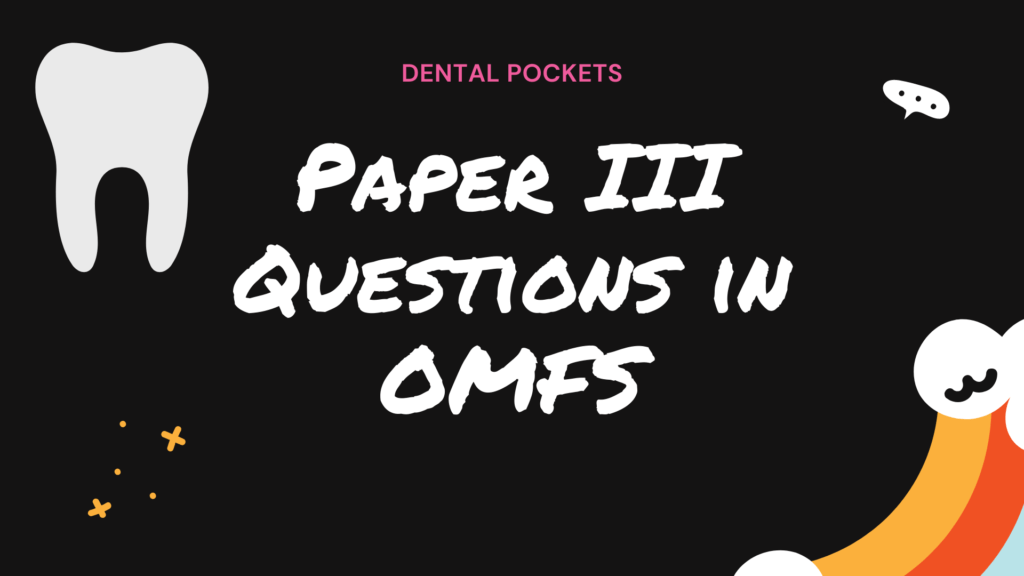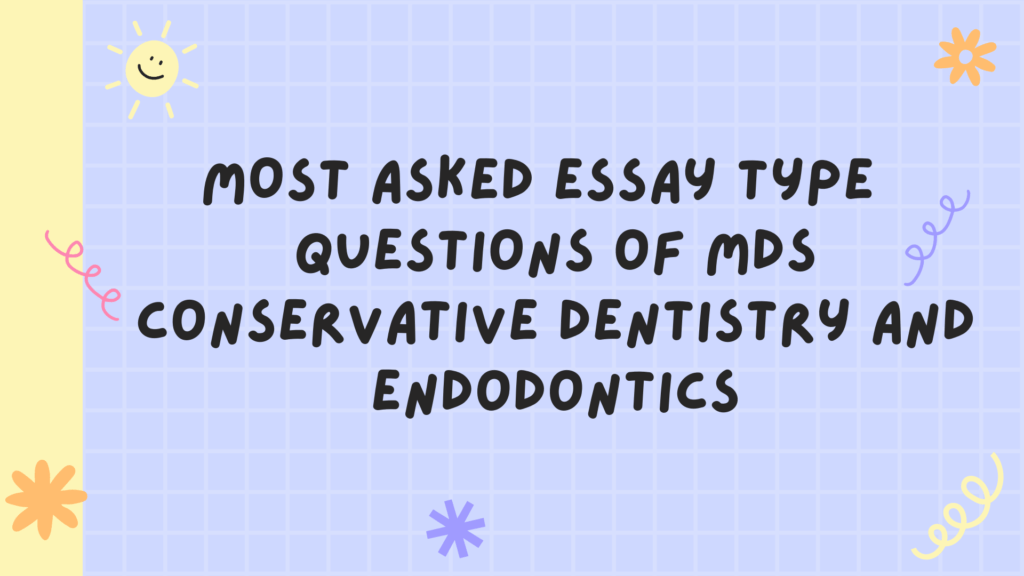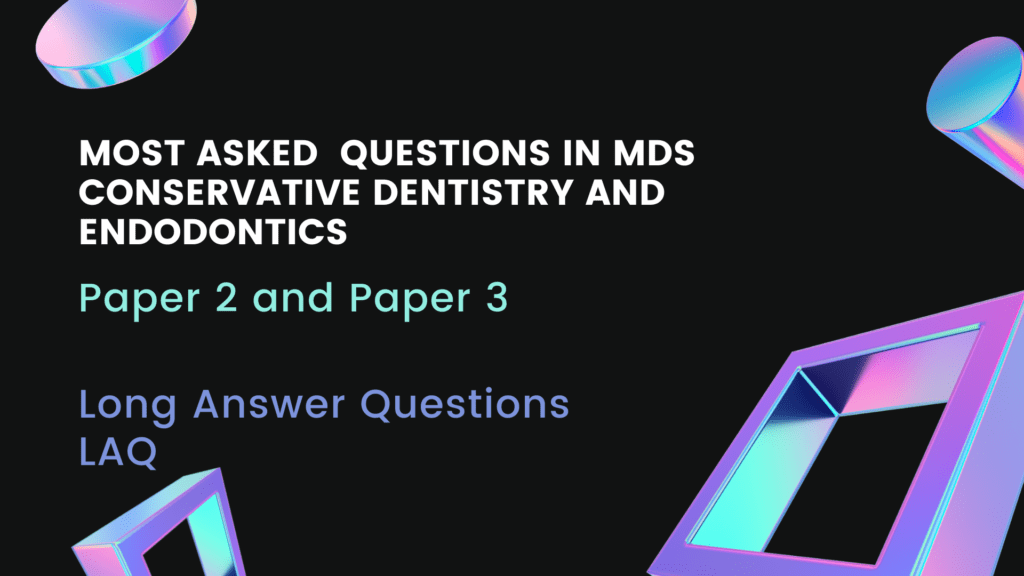Hi there, With the help of Dr. Shreya Shukla, I’m pleased to give you this exhaustive list of OMFS Paper III – Long Question asked previously in the past years from all over the universities in India. Remember, this is not a complete list, and we shall keep on adding new questions as soon as we find them. You can comment below questions/topics which your university has asked if it is missing, and we shall add that too. Do check the DCI syllabus and prepare accordingly.
OMFS Paper III – Long Question
- Write in detail about the current methods in diagnosing the management of internal derangement of TMJ.
- Write in detail about the management of ulcero-proliferative active lesion of the buccal mucosa in a 65-year patient with a history of tobacco chewing.
- What are radiotherapy protocols? Briefly mention radiotherapy complications and describe in detail ORN and its management.
- Describe the anatomy of the parotid gland and how will you manage and treat the case of pleomorphic adenoma involving the parotid gland.
- What is gummy smile. Discuss diagnosis treatment planning and management of the same
- Describe in detail about the development of the palate. Describe anomalies of the palate, describe in brief any one technique for repair of bilateral cleft palate.
- How will you manage a 22 years female patient having a complaint of facial symmetry and give a history of surgery for unilateral TMJ ankylosis?
- What are the indications for partial and total maxillectomy? Describe comprehensive management of a patient undergoing total maxillectomy.
- Describe the aetiology and clinical features of the parotid fistula. How will you manage and investiage parotid fistula
- Describe the development of the upper lip. Describe various anomalies of the upper lip. Discuss various techniques to treat cleft lip deformity.
- Classify salivary gland tumours. Discuss the management of malignant pleomorphic adenoma, involving the parotid gland.
- Describe management of maxillary hyperplasia in a patient with repaired cleft palate.
- Describe the principle and application of laser technology in oral and maxillofacial surgery.
- Describe the management of a 13 years old child having an aggressive juvenile, ossifying fibroblastic, neoplastic lesion involving the body of the mandible.
- Describe the management of a patient with a non-healing ulcer 3 cm in size involving the lateral border of the tongue.
- Describe the management of patient with micrognathia and OSAS.
- Discuss the management of a patient with an osteochondroma of the condylar head and resulting facial asymmetry.
- Describe the various techniques of facial reanimation in a patient of long standing bells palsy.
- Discuss in detail the investigation and management of a case of unilateral condylar hyperplasia.
- Describe in detail about access osteotomies performed while treating various lesions in the oral and maxillofacial region
- Classify orofacial cleft. Describe the management of maxillary hypoplasia in a patient with repaired cleft palate.
- Write in brief about diagnostic investigation and management of vascular malformation of jaws.
- Classify osteogenic tumours of the jaw. How will you diagnose and treat a case of osteogenic sarcoma of the maxilla?
- Describe management of bi maxillary protrusion.
- Describe various techniques of a direct and indirect method for sinus lift procedure. Discuss the use of bone grafts and possible complications.
- Describe the clinical features and management of a patient with T2 N1 M0 lesion involving the lateral border of the tongue.
- CL CP classification. Management of cleft lip.
- Describe clinical features of patients with class 3 prognathism and its surgical management.
- Classify bone grafts and discuss in detail about micro-vascular free fibular graft.
- Discuss in detail clinical features treatment planning surgical modalities for the management of long face syndrome.
- Discuss aetiology clinical features pathophysiology and management of chronic osteomyelitis of the mandible.
- Classify fibro-osseous lesions of jaw. How will you manage a case of fibrous dysplasia of maxilla.
- Write in brief about diagnostic investigations and management of vascular malformation of jaw.
- Classify odontogenic tumour of the jaw. Discuss the etiopathogenesis, clinical features and management of ameloblastoma with special emphasis on reconstruction.
- Describe etiology clinical features and management of apertognathia.
- Discuss the management mandibular and maxillary bone fractures in children
- Discuss fibro-osseous lesions of the jaw and how will you manage a case of ossifying fibroma of the body of the mandible
- Discuss the indications of osteotomes and describe the various techniques modifications and complications of le fort 1 osteotomy
- Write in detail about myocutaneous flaps used in maxillofacial reconstruction.
- Discuss the differential diagnosis of oro facial pain and its management
- Discuss the biology, indication and modification of BSSO.
- Discuss the management of benign odontogenic tumor of mandible in young adult
- Discuss on management of stage III squamous cell carcinoma in a 5th decade adult patient.
- Enumerate the staging of oral cancer and the importance of tumour markers. Describe the surgical management of squamous cell carcinoma involving the lateral two-thirds of the tongue.
- Discuss the diagnosis and treatment of mandibular prognathism
- Discuss in detail TMJ dysfunction syndrome and its management.
- Describe the various giant cell lesions of the jaw and write in detail the differential diagnosis, clinical features, histopathology and management.
- Describe the indications, step technique and complications of le fort 1.
- Enumerate the premalignant lesions and conditions and their management. Describe the mode of spread of malignant tumours.
- Role of skin grafts and flaps in oral surgery
- Discuss the diagnosis and management of odontogenic tumors
- Discuss cosmetic surgeries for facial deformity
- Classify cyst of jaw and management of OKC of mandible
- Functional neck dissection
- Use of CT in oral surgery
- Trigeminal neuralgia with treatment modalities
- Sinus lift procedure
- Approaches to TMJ
- Ashley’s flap
- Acidosis
- Flial chest
- Brachytherapy
- Sialography
- Mid face degloving approach
- Anterior Maxillary osteotomy
- AV malfunction
- Skin graft
- Controversies in internal derangement of TMJ
- Tracheostomy
- Epistaxis assessment and management
- Principles of Trauma Management
- Write different modes of reconstruction of cheek
- Write various problems involved in wound healing and latest methods of management
- Write pathophysiology, classification of nerve injury and explain about compartment syndrome
- Describe etiology, clinical features and treatment plan of ameloblastoma
- Describe various orthognathic surgical procedure in prognathic mandible
- Discuss with examples current concepts and controversies in management of craniofacial anamolies.
- Classify neck dissection and its complications
- Classify TMJ ankylosis and discuss the etiology, clinical features and management of TMJ ankylosis in 12 years boy.
If you find some questions missing, do let us know via commenting in the section below and we shall add those questions too. OMFS Paper III – Long Question. These questions might come in handy when you are preparing for your MDS Final Year Paper III (Essay Type) Exam in Oral and Maxillofacial Surgery.
To check out Conservative and Endodontics Paper II & Paper III Questions asked in universities around India for MDS Final Year Exams, click here.
Last updated on March 7th, 2023 at 18:45


